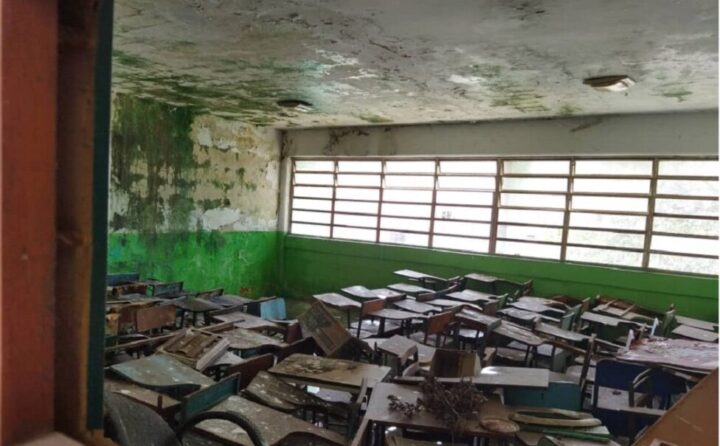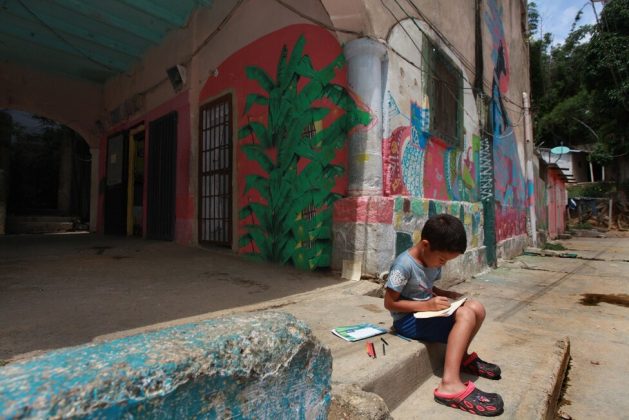CARACAS, Jul 10 (IPS) – Hundreds of thousands of children and young people, and thousands of their teachers, drop out of regular schooling in Venezuela year after year, and most of those who remain go to the classroom only two or three days a week, highlighting the abysmal backwardness of education in the country.
“Why continue studying, to graduate unemployed and earn a pittance? We prefer to get into a trade, make money, help our parents; there are a lot of needs at home,” Edgar, 19, who with his brother Ernesto, 18, has been gardening in homes in southeastern Caracas for three years, told IPS.
A study this year by the non-governmental organization Con la Escuela (With the School), in seven of Venezuela’s 24 states -including the five most populated- found that 22 percent of students skip classes to help their parents, and in the 15-17 age group this is the case for 45 percent of girls.
In the school where teacher Rita Castillo worked, in La Pomona, a shantytown in the torrid western city of Maracaibo, “for many days in a row there is no running water, there are blackouts, and it’s impossible to use the fans to cool off the classrooms,” she told IPS.
The classes in the school are divided into 17 to 25 children each: the first three grades of primary school attend on Mondays and Tuesdays, the next three grades on Wednesdays and Thursdays, and Fridays make up for whoever missed class the previous days. That is in the mornings; secondary school students attend during the hot afternoons.
These are the first steps towards the definitive dropout of students: 1.2 million in the three years prior to 2021 and another 190,000 in the 2021-2022 school year, with 2022-2023 still to be estimated, with no signs of a reversal in the trend.
“The dropout rate is also high in secondary schools in Caracas, and the students who remain often pass from one year to the next without having received, for example, a single physics or chemistry class, due to the shortage of teachers,” Lucila Zambrano, a math teacher in public schools in the populous western part of the capital, told IPS.
Authorities in the education districts are increasingly calling on retired teachers to return to work, “but who is going to return to earn for 25, 20 or less dollars a month?” Isabel Labrador, a retired teacher from Colón, a small town in the southwestern state of Táchira, told IPS.
Currently, the monthly food basket costs 526 dollars, according to the Documentation and Analysis Center of the Venezuelan Federation of Teachers.

Teachers held colorful street protests in the first few months of 2023, demanding decent salaries and other benefits acquired by their collective bargaining agreement, and these demands remain unheeded as the school year ends this July.
Teachers earning ridiculously small salaries, high school dropout rates, rundown infrastructure, lack of services, loss of quality and a marked lag in the education of children and young people are the predominant characteristics of Venezuelan public education today.
But “the education crisis did not begin in March 2020 with the COVID-19 pandemic. These are problems that form part of the complex humanitarian emergency that Venezuela has been experiencing for many years,” Luisa Pernalete, a trainer and researcher at the Fe y Alegría educational institution for decades, told IPS.
Numbers in red
In the current school year, enrollment in kindergarten, primary and secondary education totaled 7.7 million, said Education Minister Yelitze Santaella, in this country which according to the National Institute of Statistics has 33.7 million inhabitants, but only 28.7 million according to university studies.
The difference in the numbers may be due to the migration of more than seven million Venezuelans in the last decade, according to United Nations agencies – a figure that the government of President Nicolás Maduro considers exaggerated, although it has not provided an alternative number.
The attraction or the need to migrate, in the face of the complex humanitarian emergency – whose material basis begins with the loss of four-fifths of GDP in the period 2013-2021 – also mark the desertion of students and teachers.
In the three-year period ending in 2021 alone, 166,000 teachers (25 percent of the total) and 1.2 million students (15 percent of the number enrolled at the time), dropped out, according to a study by the private Andrés Bello Catholic University (Ucab) in Caracas, ranked as the top higher education center in the country.
Con la Escuela estimates that at least 40 percent of the teachers who have quit have already emigrated to other countries.
Educational coverage among the population aged three to 17 years continues to decline: 1.5 million children and adolescents between those ages were left out of the education system in the 2021-2022 period. The hardest hit group is children between three and five years of age, where coverage amounts to just 56 percent.
According to official figures, there are 29,400 educational institutions in the country, of which 24,400 are public, with 6.4 million students and 542,000 teachers; and 5,000 are private, with 1.2 million students and 121,000 teachers.
They cover three years of early education, six years of primary school and five years of secondary school. It was decreed 153 years ago that primary education should be free and compulsory.
According to Ucab and Con la Escuela, 85 percent of public schools do not have internet, 69 percent have acute shortages of electricity and 45 percent do not have running water. There are also deficiencies in health services (93 percent), laboratories (79 percent) and theater or music rooms (85 percent).
Surveying 79 public schools in seven states, Con la Escuela found that 52 percent of the bathrooms are in poor condition, 35 percent of the schools do not have enough bathrooms, and two percent have no bathrooms.
In 19 percent of the schools classes have been suspended due to the damage to the toilets, and 34 percent do not have sewage pipes.
“Water is the service that generates the most suspension of classes in Venezuela,” Pernalete said. “Classes can be held without electricity in the school, but you can’t do without water, and if the service fails in the community or in the whole town, then it’s hard for teachers to go to work or the families don’t send their children to school.”
Con la Escuela also found that 36 percent of the classrooms are insufficient for the number of youngsters enrolled, 44 percent of the schools have classrooms in poor condition and 50 percent reported desks in poor condition.
Moreover, the Ucab investigation found “ghost schools”, which appear in the Education Ministry figures but are actually only empty shells.
“We have gone to the field with the list of these schools and we have found that they no longer exist. There are just four walls standing,” said Eduardo Cantera, director of Ucab’s Center for Educational Innovation.
From precariousness to backwardness
If the salary of a new teacher in a public school is 20 dollars a month, those who are five levels higher in the ranks do not earn much more, just 30 or 35 dollars, although they do receive some bonuses that are not part of the salary.
In Caracas, private schools – which serve from kindergarten to the end of high school – a teacher earns about 100, maybe 200 or more dollars, depending on seniority, hours of work, and the families’ ability to pay.
The drop in wages cuts across the entire labor spectrum. The basic minimum is around five dollars a month, although there are food bonuses, and the average salary of formal sector workers is around 100 dollars.
It is a difficult figure to reach for many of those who work in the informal sector of the economy – 60 percent of the country’s workers according to the Survey of Living Conditions that Ucab carried out in 2022 among 2,300 households across the country.
It is a consequence of the gigantic setback of the Venezuelan economy – GDP shrank by four-fifths between 2013 and 2021 – compounded by almost three years of hyperinflation between 2017 and 2020, and depreciation that liquefied the value of the local currency, the bolivar, and led to a costly de facto dollarization.
Although public education is formally free, parents must contribute a few dollars each month to help maintain the schools. In private schools, prices are raised under the guise of extraordinary fees – the only way to obtain funds that make it possible for them to hold onto their teachers.
Pernalete says that in the interior of the country many teachers have to walk up to an hour to get to school -there is no public transportation or they can’t afford to take it-, not to mention the lack of water or electricity in their homes, or the absence of or the poor quality of internet connection, if they can afford it, or the lack of other technological resources.
And if they do have internet, that’s not always the case for their students.
Damelis, a domestic worker who lives in a poor neighborhood in Los Teques, a city neighboring Caracas, has three children in school. Some teachers, she told IPS, assign homework through a WhatsApp group, but in her home no one has a computer, internet or smartphone.
What is the result? The initial reading assessment test that Ucab recently administered to 1,028 third grade students nationwide showed high oral and reading comprehension (82 and 85 percent, respectively), but low reading aloud and decoding skills (43 and 53 percent).
More than 40 percent of the students only read 64 words per minute or less, when they should read 85 or more. Con la Escuela applied the test to 364 students in Caracas and the neighboring state of Miranda, and the children only read 48 words per minute.
There is also discouragement among teachers. The main public teaching university in the country has almost no applicants. In the School of Education at Ucab, the first two years have been closed due to a lack of students, despite the fact that the university offers scholarships to those who want to train as teachers.
What can be done? “The physical recovery of schools should be one of the first steps to guarantee their fundamental function: to serve as a center for socialization and meeting of teachers, students and representatives around the teaching-learning process,” said Cantera.
“Otherwise, the consequences will be very serious for the country’s development,” he said.
Labrador said she observes “a gradual privatization of education, it is no longer truly free,” and the disparity between public and private education is increasing inequality in a country where in the second half of the 20th century public education stood out as the most powerful lever for social ascent.
Pernalete said it is a matter of complying with the 1999 Constitution, which stipulates that workers’ salaries must be sufficient to live on and establishes the government’s commitment to the right to education, as it states that education and work are the means for the realization of the government’s goals.
© Inter Press Service (2023) — All Rights ReservedOriginal source: Inter Press Service
Check out our Latest News and Follow us at Facebook
Original Source

